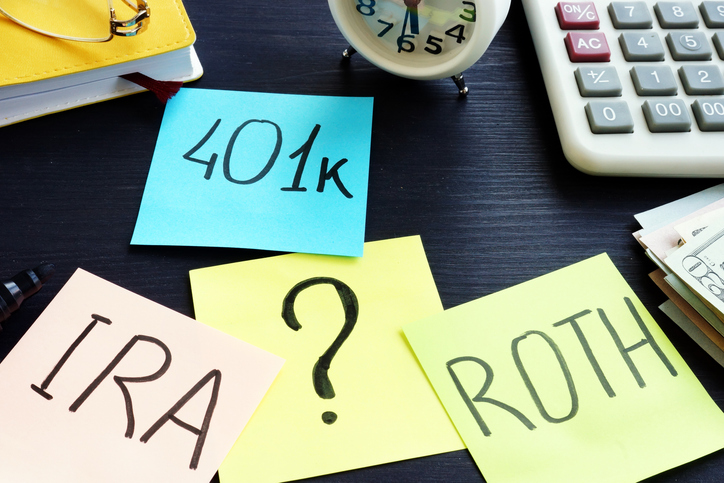

A divorce is an unfortunate time in anyone’s life, as it signifies the end of a likely long-term relationship and marriage. However, it’s important to understand the financial ramifications of a divorce as you’re going through one. So if you’re in the process of filing for divorce, the fate of your pension is likely at the forefront of your mind. There are a number of different ways that this situation could unfold. Here’s what you need to know.
A financial advisor can help you create a financial plan for your needs and goals before and after a divorce.
A pension earned by one spouse is usually considered a joint asset, as are other retirement accounts, such as 401(k)s, 403(b)s and IRAs, although state laws govern the latter. Usually, whatever is earned prior to the marriage remains separate property, while what is earned during the marriage is considered a joint asset.
However, the division of a pension in a divorce isn’t always a cut-and-dried situation. For one, unless you are actively receiving a pension (and thus know the exact details of the payment amount and frequency), it can be difficult to pin down its exact value.
Additionally, while a pension is usually considered a joint marital asset, that doesn’t mean it’s always split 50/50. The exact amount varies according to each state’s law and how much of the pension was earned during the marriage. Remember that if you and your spouse signed a prenuptial agreement protecting your pension, it’ll remain yours.
If you have a military or government pension, these are governed by their own specific set of rules and may not be subjected to the same rules when splitting your assets in a divorce.

If you have a pension, you’ve likely heard of the Employee Retirement Security Act of 1974 (ERISA). This is the set of regulations that protect pension holders. However, 1984 brought the Retirement Equity Act, which protects spousal benefits as they relate to pensions.
In order to gain access to a percentage of your pension, your spouse would have to specifically ask for their share at the time of the divorce – not at the time of your retirement. This is done via a court order called a qualified domestic relations order (QDRO).
If your spouse is entitled to half or a portion of your pension, it would be withdrawn at the time of the divorce settlement and transferred into their own retirement account, usually an IRA. It’s important to note that with a QDRO, the spouse is exempt from the tax ramifications of receiving their settlement.
A general rule of thumb when it comes to splitting pensions in divorce is that a spouse will receive half of what was earned during the marriage. However, this depends on each state’s laws governing this subject.
In equitable distribution states, assets (like your pension) are divided fairly – but this doesn’t necessarily mean 50/50. The vast majority of states are equitable distribution states. But there are also a few community property states, where all marital property is simply divided 50/50.
There are only nine community property states – Arizona, California, Idaho, Louisiana, Nevada, New Mexico, Texas, Washington and Wisconsin. Other states, including Alaska, Florida, Kentucky, Tennessee and South Dakota, allow spouses to opt into a community property system.
It is possible for an ex-spouse to claim a portion of a pension years after the divorce, especially if the division of the pension was included in the original divorce decree but not acted upon. However, the ability to make such a claim depends on several factors:
If you have a pension and are in the midst of a divorce, don’t just fork over half blindly. You may have a few bargaining chips on your side. First, find out if your soon-to-be ex has a retirement of their own. If it’s comparable to yours in value, it may behoove both of you just to call it even. After all, think of the money you’ll save on lawyers alone.
Second, if your spouse doesn’t have a retirement account that’s equal to your pension, consider other joint marital assets that you may be able to offer them instead. Real estate would be your best choice here. In lieu of splitting your pension, try offering up your former home or another piece of comparable real estate.

When facing a divorce, your spouse will generally be entitled to some of your pension. However, how much your spouse will receive varies, as the laws governing pensions in divorce settlements vary by state. If you have a pension and are getting a divorce, you can still do things to protect your financial interests. For instance, familiarize yourself with your plan and its details. The more you know prior to settlement, the better. You can also hire an attorney with experience in pensions, or you could consider a QDRO specialist. And lastly, don’t automatically assume that you’ll lose half your pension. This isn’t always the case since most settlements are based on what was earned during the marriage.
Photo credit: ©iStock.com/Avosb, ©iStock.com/eclipse_images, ©iStock.com/clubfoto
Rachel CauteroRachel Cautero writes on all things personal finance, from retirement savings tips to monetary policy, even how young families can best manage the financial challenges of having children. Her work has appeared in The Atlantic, Forbes, The Balance, LearnVest, SmartAsset, HerMoney, DailyWorth, The New York Observer, MarketWatch, Lifewire, The Local: East Village, a New York Times publication and The New York Daily News. Rachel was an Experian #CreditChat panelist and has appeared on Cheddar Life and NPR’s On Point Radio with Meghna Chakrabarti. She has a bachelor’s degree from Wittenberg University and a master's in journalism from New York University. Her coworkers include her one-year-old son and a very needy French bulldog.
Read More About Retirement



More from SmartAsset
SmartAsset Advisors, LLC ("SmartAsset"), a wholly owned subsidiary of Financial Insight Technology, is registered with the U.S. Securities and Exchange Commission as an investment adviser. SmartAsset's services are limited to referring users to third party advisers registered or chartered as fiduciaries ("Adviser(s)") with a regulatory body in the United States that have elected to participate in our matching platform based on information gathered from users through our online questionnaire. SmartAsset receives compensation from Advisers for our services. SmartAsset does not review the ongoing performance of any Adviser, participate in the management of any user's account by an Adviser or provide advice regarding specific investments.
We do not manage client funds or hold custody of assets, we help users connect with relevant financial advisors.
This is not an offer to buy or sell any security or interest. All investing involves risk, including loss of principal. Working with an adviser may come with potential downsides such as payment of fees (which will reduce returns). There are no guarantees that working with an adviser will yield positive returns. The existence of a fiduciary duty does not prevent the rise of potential conflicts of interest.